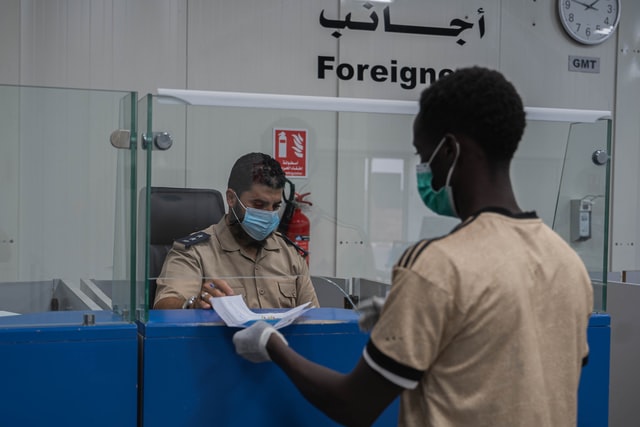
BLACK BORDERS: RACISM IN WAR AND POST WAR MIGRATION
Photo by Moayad Zaghdani on Unsplash
By Eliana RIley-Guiu
Around 2.6 million people have fled Ukraine since the start of it’s invasion on the 24th of February earlier this year. Threatened by ground invasions and military air strikes, the people of Ukraine had no choice but to leave their homes in search of safety, no matter where that might be. With only the belongings that they could carry on their back, many refugees made torturous journeys on foot to surrounding borders, hoping to be accepted by the places beyond.
For some this tragically wasn’t the case. Many people found themselves waiting at the borders with nothing to eat and no water for days on end, some were even told to “go back”, all whilst watching other refugees be given access straight away. This was the case of Gifty Naana Mensah, who was studying at university in Western Ukraine. She had to wait at the Polish border for 2 days, and was only let into immigration control because of her visible exhaustion.
Surely in a time of such crisis, where people’s lives are on the line, open borders wouldn’t discriminate over who can and can’t come through? This is confusing only until you realise the majority of those who were told to wait were African or Asian, and you consider how freedom and mobility in this day and age is informed by racist exceptionalism. Along with Gifty, who is from Ghana, there more than 16,000 African students in Ukraine, a lot of whom faced hostility at the border.
Racism is also present in the media’s handling of the Ukraine war. Compared to the sense of otherness created in the portrayal of Syrian refugees, who were fleeing from similar war torn areas, there is more of an empathetic focus on Ukrainian refugees. Their situations are deemed far more disturbing to the British public and thus are more of a cause for concern. Many media spokespeople refer to similarities in Ukrainian people and Westerners as reason to help or be outraged:
“This isn’t Iraq or Afghanistan […] This is a relatively civilised, relatively European city” – Charlie D’Agata, CBS
“War is no longer something visited upon impoverished and remote populations” – Daniel Hannan, The Telegraph
“What’s compelling is looking at them, the way they are dressed. These are prosperous, middle-class people. These are not obviously refugees trying to get away from the Middle East […] or North Africa. They look like any European family that you’d live next door to” – Peter Dobbie, Al Jazeera
These responses stem from orientalist expectations of who should be subjected to war. Conflict and the need for humanitarian aid in countries, such as those in Sub-Saharan Africa, are considered normal and people are desensitized to it.
Back at home, Britain prided itself in its response to the migrant crisis after choosing to allow 200,000 Ukrainians into the country. But what is shocking is Britain’s refusal to allow even a tenth of that number of people from Syria and Yemen. Strict migration policies are systematically inflicted upon non-European people, whose lives are automatically deemed as less valuable. This has transformed the Mediterranean sea into a death scape after many migrants have no choice but to attempt dangerous border crossings, which is barely seen in the media.
Racism is not just about individuals being prejudiced to certain people, such as at the Polish border, but is about the institutional structures which stand in peoples way. Occurrences such as these reiterate the complex histories of systematic racism in migration policy. Britain’s subordination of migrants really came to surface after many people from former colonized countries migrated to England as a result of the huge demand for labour after World War 1. After the country was rebuilt, aggressive policies illegalized the mobility of many of these people, some of whom were deported. Again, these policies disproportionately focused on black and brown immigrants and we can still see their repercussions in the case of the recent Windrush scandal.
In this day and age, borders are heavily racialised. Ideological myths of an anti-black Europe has served to restrict the mobility of many people of certain races and ethnicities. Freedom of movement is only true to a select few people who have been lucky enough to be born in a certain place, and in many cases, in a certain skin.

0 Comments